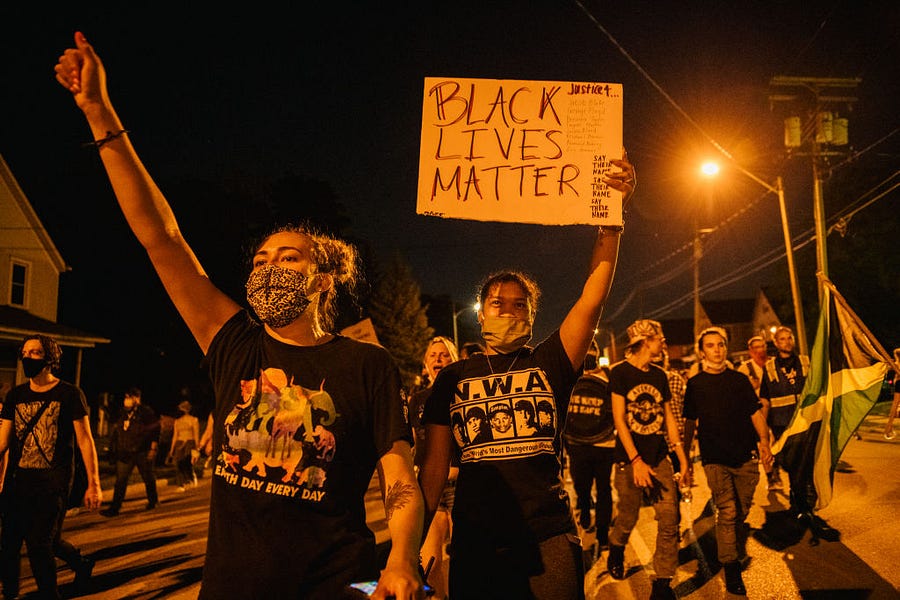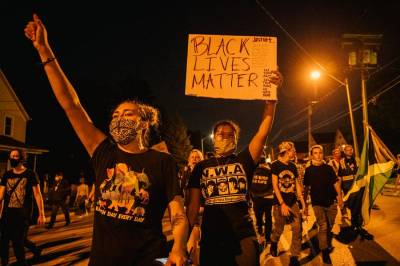Happy Thursday! A correction from yesterday’s edition. We wrote that Vice President Pence filmed an RNC video outside of Abraham Lincoln’s childhood home in Kentucky. Although Lincoln was born in Hodgenville, Kentucky, Pence’s remarks were actually filmed two hours northeast, at the Lincoln Boyhood National Memorial in Spencer County, Indiana. But we all know Lincoln is truly an Illinoisan at heart!
Quick Hits: Today’s Top Stories
The United States confirmed 43,891 new cases of COVID-19 yesterday, with 4.3 percent of the 1,013,309 tests reported coming back positive. An additional 1,230 deaths were attributed to the virus on Wednesday, bringing the pandemic’s American death toll to 179,695.


Hurricane Laura made landfall overnight in Louisiana and Texas, bringing destructive winds and rain to a vast swath of America’s southern coast. The storm hit Cameron, Louisiana, at 1 am as a Category 4 hurricane and left significant damage in its wake. Although it was downgraded to a Category 2 storm after coming ashore, authorities warn that it's still dangerous.
Abbott Laboratories announced on Wednesday that its new, 15-minute rapid COVID-19 test received an FDA Emergency Use Authorization. The tests were found in a clinical study to have a sensitivity of 97.1 percent and specificity of 98.5 percent. Shipments will begin in September, and the company aims to be delivering 50 million tests per month by October.
Kyle Rittenhouse, 17, of Antioch, Illinois, was charged with first-degree intentional homicide on Wednesday. He allegedly shot three people, killing two, in the continued standoffs between militias and rioters in Kenosha, Wisconsin following the police shooting of Jacob Blake.
The Trump administration banned 24 Chinese companies from buying American products on Wednesday in response to their aiding the construction of artificial islands in the South China Sea. The State Department also announced visa restrictions on individuals complicit in the militarization of the Sea.
The NBA postponed all three playoff games scheduled for Wednesday after the Milwaukee Bucks’ players’ strike—in protest of the Jacob Blake shooting—rippled across the league. Several MLB, WNBA, and MLS games were postponed Wednesday night as well.
Four U.S. military service members were reportedly injured in Syria on Wednesday after a Russian military convoy collided with their vehicle on Wednesday.
The Centers for Disease Control updated its coronavirus testing guidelines earlier this week to say people who have been in close contact with a person with COVID-19 but remain asymptomatic “do not necessarily need a test unless [they] are a vulnerable individual.” Dr. Anthony Fauci told CNN yesterday the decision to change testing recommendations was made during a coronavirus task force meeting that he missed due to surgery, and that he is “concerned” that the new recommendations “will give people the incorrect assumption that asymptomatic spread is not of great concern.”
Carnage in Kenosha

Americans woke up Wednesday to horrible news out of Kenosha, Wisconsin: As demonstrations continued throughout the night, rioters had clashed with members of a right-wing militia that had assembled, ostensibly to prevent further damage to city buildings and businesses after rioting the night before. Video shows that one of those encounters turned to disaster: 17-year-old Kyle Rittenhouse allegedly shot and killed a man who had yelled and run at him in a parking lot and then fled the the scene. Shortly after, video shows a man believed to be Rittenhouse run down a street pursued by several people, then tripping and falling. As one jumped on him and another approached from the side, he fired several more times—killing one and wounding the other. He was arrested Wednesday and charged with first-degree homicide.
Cell phone videos of both shootings rocketed around social media yesterday, as did a third clip: a Kenosha police officer chatting with a group of the militia—seemingly including Rittenhouse—earlier in the night, offering them water bottles and saying that “we appreciate you guys, we really do.”
Afterward, Wisconsin Gov. Tony Evers, who had deployed 250 members of the Wisconsin National Guard to Kenosha on Monday to assist local law enforcement, authorized another 500 guardsmen—a move for which President Trump, who has pushed for more aggressive enforcement during riots, took credit.
The increased mobilization came as a relief to state Sen. Van Wanggaard, who represents much of Kenosha County and had spent the week advocating for more enforcement help.
“Kenosha, it’s 100,000 people, but its urban center is very small,” Wanggaard’s chief of staff, Scott Kelly, told The Dispatch. “So 3,000 people could occupy downtown Kenosha easily, and you wouldn’t be able to move them. … There were people who were legitimately guarding their property and there were other people who were, you know, deputizing themselves and being vigilantes. And you can’t have that.”
One state away, renewed unrest in Minneapolis offered a hard lesson in how unstable some cities have grown during this summer of protests. A black man on the run from police for murder committed suicide on a public street downtown Wednesday afternoon, but misinformation spread on social media that police had been the ones who killed him. Police quickly released surveillance video of the man’s self-inflicted death, showing that officers had in fact attempted to save his life by administering first aid. To no avail—rioters went ahead with riots anyway, breaking windows and setting buildings alight throughout the night.
The turmoil provoked an unusually sharp reaction from Minneapolis Mayor Jacob Frey. Frey had gone to great lengths to soothe protesters following the death of George Floyd, attempting to engage them in dialogue only to be shouted down when he refused to commit to abolishing his city’s police force. On Wednesday, Frey ordered a curfew and requested assistance from the National Guard.
“What our city needs right now is healing,” he told reporters. “We do not need more destruction. We do not need property damage. That is unacceptable in every way, shape, and form. I want to be very clear: It will not be tolerated.”
As the unrest continued to spread Wednesday, new facts were simultaneously emerging about the event that sparked it: the Sunday arrest and shooting of Jacob Blake. Police scanner audio suggested that Blake had perhaps not been a bystander or even Good Samaritan breaking up a fight, as eyewitnesses initially reported: A woman had called police to say that Blake was at her home, had taken her keys, and wouldn’t give them back. The dispatcher further advised the officers that Blake had an outstanding warrant for his arrest.
This seemingly explains the mystery of why the officers detained Blake in the first place, but not why they escalated the situation to a point of using deadly force. A press release from Wisconsin’s attorney general Josh Kaul hints at what the officers’ story might be: “Mr. Blake admitted he had a knife in his possession and DCI agents recovered a knife on the driver’s side floorboards of Mr. Blake’s vehicle.”
What still isn’t clear is whether the knife was in Blake’s car throughout his tangle with the officers, or whether he had it in hand and dropped it after being shot. During a Wednesday press conference, Kaul declined to comment on whether officers knew Blake had a knife before the shooting. The bystander who took the viral video of the altercation told local reporters he heard officers yelling for Blake to “drop the knife”—but also said that he had not seen a knife in Blake’s hands himself.
Hurricane Laura ‘Is Gonna Be More Powerful Than Rita’
Hurricane Laura had morphed into a Category 4 storm as it neared the Louisiana and Texas coasts, with 150 mph winds and an unsurvivable storm surge expected at landfall. “This surge could penetrate up to 40 miles inland from the immediate coastline, and flood waters will not fully recede for several days after the storm,” the National Hurricane Center said Wednesday afternoon. More than 500,000 people have been ordered to evacuate the Gulf Coast by Texas and Louisiana authorities.
With wind speeds approaching the 157 mph threshold for a Category 5 storm, Hurricane Laura could be one of the strongest storms on record to hit the U.S. “You’re gonna hear ranges of storm surge that we haven’t heard in Louisiana since Hurricane Audrey in 1957,” Louisiana Gov. John Bel Edwards said in a press conference Wednesday afternoon. “If you think you’re safe because you made it through Rita in southwest Louisiana, understand this storm is gonna be more powerful than Rita,” he added. “Even if you built back stronger and you’re up at 15 feet elevation, understand the storm surge is gonna be expected to be 18-20 feet in that immediate area where this storm comes and makes landfall.” Edwards urged state residents to comply with local authorities’ evacuation orders, especially those living in the coastal Cameron Parish region.
Texas Gov. Greg Abbott also urged residents to evacuate Wednesday afternoon before the storm hit. “Beginning about 9 a.m. tomorrow morning, we will begin the process of going in and going through rescues,” he said in a press conference Wednesday. “But it’s important for people to know that from about 7 p.m. tonight until about 9 a.m. in the morning, there will be a little bit of a lockdown time period for the ability of rescuers and aiders to get in and provide support for anybody in the local regions.”
Day Three with the GOP (and a word about the Hatch Act)
On the third day of the GOP convention, speakers—from Gov. Kristi Noem, to Sen. Marsha Blackburn, to the president of the National Association of Police Organizations—painted Republicans as the party of law and order, repeatedly referencing the months of unrest in cities across the country. Civil rights activist Clarence Henderson cited Trump’s record funding for historically black colleges and universities in his endorsement of the president. In the night’s keynote speech, Vice President Pence joked that his own mother likes Trump more than she does him—before making a law and order case of his own.
“Last week, Joe Biden didn’t say one word about the violence and chaos engulfing cities across this country,” Pence said. (Biden has now condemned the violence and looting twice this week.) “Let me be clear: the violence must stop—whether in Minneapolis, Portland, or Kenosha. Too many heroes have died defending our freedoms to see Americans strike each other down.”
But one of the bigger conversations related to the Republican National Convention this week has been centered around a little-known piece of legislation from 1939: The Hatch Act.
Charlotte wrote an explainer of the law up for the site today, but we wanted to provide a brief overview of what it is, and why everyone seems to be talking about it this week.
As Charlotte writes, the Hatch Act was “designed to prevent federal employees acting in their official capacity from engaging in overt political activity.” It was introduced by Sen. Carl Hatch in the late 1930s after it was revealed the Works Progress Administration used federal funds to help elect Democratic candidates in the 1938 elections. The bill passed—on a bipartisan basis—a year later, and the Supreme Court upheld it in 1947 and again in 1973.
Why is it coming up now?
A speech by Secretary of State Mike Pompeo from Jerusalem and a naturalization ceremony performed by Acting Homeland Security Secretary Chad Wolf in the White House, both aired during the Republican National Convention on Tuesday night.
Although Pompeo refrained from using his official secretary of state title (“I have a big job … as Susan’s husband and Nick’s dad,” he said with a grin), he delivered an unmistakably partisan speech praising the president’s many foreign policy achievements. “Delivering on [the] duty to keep us safe and our freedoms intact, this president has led bold initiatives in nearly every corner of the world,” Pompeo said from Jerusalem, before outlining Trump’s past and ongoing global initiatives.
Acting Homeland Security Chad Wolf appeared during the convention in a pre-recorded video of a surprise naturalization ceremony in the White House. The footage featured Wolf administering the oath of allegiance to five new citizens as President Trump looked on.
Is it actually a big deal?
It depends on who you ask—and when you ask them. Republican lawmakers and conservative groups were aghast back in 2012 when then-HHS Secretary Kathleen Sebelius violated the Act by making “extemporaneous partisan remarks” at a gala in North Carolina. As National Review’s Jim Geraghty points out, six Obama administration Cabinet secretaries spoke at the DNC in 2012.
Fast forward eight years, the roles are reversed. “Nobody outside of the Beltway really cares,” White House Chief of Staff Mark Meadows told Politico yesterday. Democratic lawmakers plan to launch an investigation. “It’s absolutely unacceptable that a sitting U.S. Secretary of State, American’s top diplomat, would use official taxpayer-funded business to participate in a political party convention,” wrote Texas Rep. Joaquin Castro, the chairman of the House Foreign Affairs subcommittee.
Worth Your Time
Nicole Bibbins Sedeca and David J. Kramer—both former George W. Bush administration officials—have an article over at The Bulwark arguing that America needs to recommit to defending democracy abroad, in part by defending it at home. “The apparent degradation of American democracy might lead some toward disengagement in democracy promotion and moral international leadership,” they write. “This would be a twofold mistake. By ignoring our role as the foremost champion of democracy around the world, we would give comfort and support to foreign despots.”
Stephanie Slade of Reason ventured into the New York Times opinion section to make the argument that some Republicans’ turn away from libertarian ideology risks “ripping out the soul of the party.” “Should these big-government conservatives get their way,” Stephanie Slade writes, alluding to Sens. Josh Hawley and Marco Rubio, “libertarians believe — like a majority of Republicans once did — that the result will be slower growth, less dynamism and fewer opportunities for all.” Slade knows that “people who want the government to stay out of your bedroom as well as your pocketbook (as the saying goes) make up an almost vanishingly small share of the voting population,” but points out that most Americans still support free trade, free enterprise, and light regulation of the economy.
Something Powerful
Presented Without Comment
Also Presented Without Comment
Also Also Presented Without Comment
Toeing the Company Line
The Dispatch Podcast made its triumphant return on Wednesday—we know, we know, we’re sorry for the extended absence. This week’s topics: The police shooting of Jacob Blake and the violence and destruction of private property that followed; the Democratic and Republican National Conventions; the RNC’s lack of an updated party platform for 2020, and inadequate comparisons between the presidential elections of 2020 and 1988. Tune in here!
Donald Trump and Joe Biden have both consistently sworn to end the “forever wars” in the Middle East, but neither has a record to back up these claims. In yesterday’s Vital Interests (🔒) newsletter, Thomas Joscelyn looks at both presidential candidates’ hypocrisy. “If President Trump or Vice President Biden think the U.S. should go to ‘zero’ in all of the lands of jihad, from Somalia to Afghanistan, then they should act accordingly,” he writes. “Otherwise, their ‘endless wars’ rhetoric is just dishonest.”
Let Us Know
Violations of the Hatch Act over the years are just one tiny example of our broader political tragedy of the commons. It’s in both parties’ self-interest to continuously breach longstanding civic norms and gain an edge—if voters don’t punish them for it. Neither ‘side’ has an incentive to unilaterally disarm and uphold traditions that benefit the political system as a whole.
But the end result is a broken and fragmented democracy that does not—and can not—reflect the will of the people. Our question to you: How do we realign those incentive structures and Make Civic Institutions Great Again, er, MCIGA?
Reporting by Declan Garvey (@declanpgarvey), Andrew Egger (@EggerDC), Charlotte Lawson (@charlotteUVA), Audrey Fahlberg (@FahlOutBerg), James Sutton (@jamespsuttonsf), and Steve Hayes (@stephenfhayes).
Photograph by Brandon Bell/Getty Images.







Please note that we at The Dispatch hold ourselves, our work, and our commenters to a higher standard than other places on the internet. We welcome comments that foster genuine debate or discussion—including comments critical of us or our work—but responses that include ad hominem attacks on fellow Dispatch members or are intended to stoke fear and anger may be moderated.
With your membership, you only have the ability to comment on The Morning Dispatch articles. Consider upgrading to join the conversation everywhere.